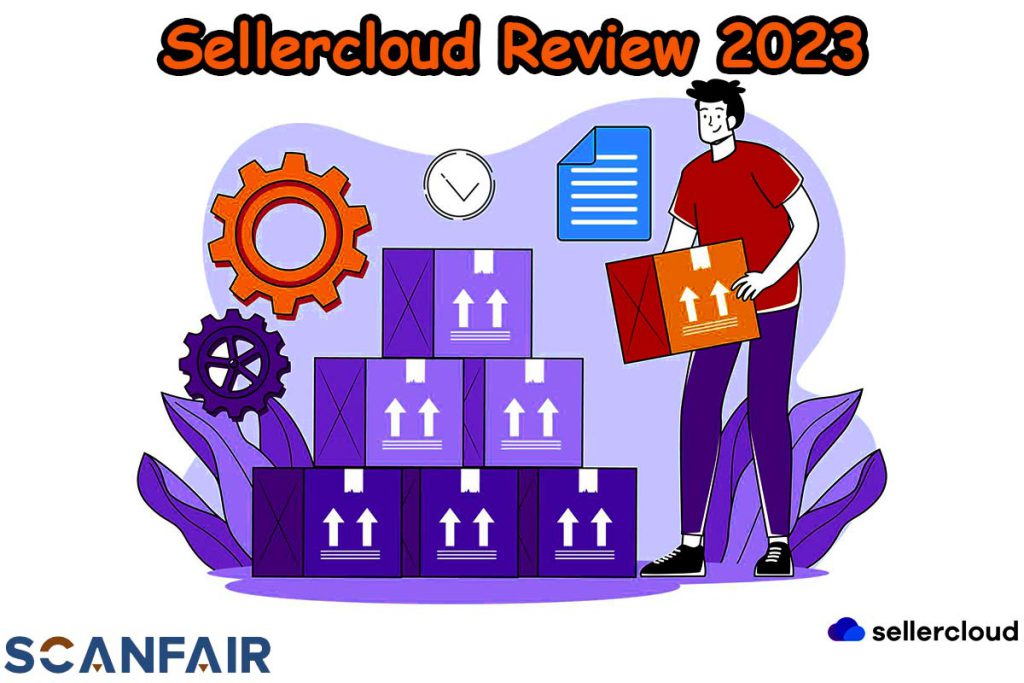In the fast-paced realm of e-commerce, managing inventory, sales channels, and order processing efficiently is pivotal for success. Sellercloud offers a solution to these challenges, promising to streamline your operations and boost your business. This review will explore Sellercloud’s features and capabilities, discovering how it can revolutionize your e-commerce enterprise. Whether you’re a small business looking to grow or an experienced e-commerce professional seeking greater efficiency, Sellercloud could be the answer. Join us as we delve into Sellercloud’s potential to redefine your e-commerce success. In the essay, we at Scan Fair will talk more about this topic.
Sellercloud Pricing & Trial
Sellercloud is a versatile e-commerce management platform designed primarily for Amazon sellers. It offers various pricing tiers to accommodate businesses of different sizes and needs.
Pricing:
- Standard Pricing: Sellercloud’s monthly pricing typically starts at $1,000. This standard pricing tier provides robust features suitable for many Amazon sellers. However, the exact cost may vary based on the size of your business, the number of SKUs you manage, and your specific requirements.
- Enterprise Pricing: For larger enterprises or businesses with more extensive operations, Sellercloud offers custom enterprise-level pricing. This tailored approach ensures you get the exact features and support needed to scale your business effectively.
Trial:
Sellercloud often offers a free trial period, allowing prospective users to explore the platform and its features before committing to a subscription. The trial duration may vary, typically around 15 to 30 days. During the trial period, users can access and test various functionalities, assess how Sellercloud aligns with their specific needs, and decide whether it’s the right solution for their Amazon selling endeavors.
It’s important to note that the availability and terms of the trial may change over time, so it’s advisable to visit Sellercloud’s official website or contact their sales team directly for the most up-to-date information on pricing and trial options. This will help you determine the best plan and approach to suit your e-commerce business’s requirements and budget.
What is Sellercloud?
Sellercloud is a versatile multi-channel management system that simplifies and optimizes various aspects of e-commerce operations. It is a central hub for businesses selling on multiple online marketplaces, offering various features and functionalities to enhance efficiency and success. Here’s a concise summary of what Sellercloud is:
Sellercloud is an e-commerce management platform that provides:
- Inventory Management: Efficiently manage inventory across different channels and marketplaces.
- Product Catalog Management: Create and maintain product listings with accurate and up-to-date information.
- Order Fulfillment: Streamline order processing and fulfillment to ensure timely customer delivery.
- Shipping and Tracking: Generate shipping labels, track shipments, and manage the shipping process seamlessly.
- Automated Emails: Automate email communications with customers for order updates, shipping notifications, and more.
- Customer Feedback: Collect and manage customer feedback and reviews to enhance your online reputation.
- Reporting and Analytics: Generate various reports, including customer ordering trends, sales performance by product and marketplace, and accounting reports.
- Integration: Easily integrate with popular accounting software programs and third-party tools.
- Export Functionality: Export generated reports for review in various popular accounting software programs.
Sellercloud’s comprehensive suite of tools and integrations is designed to help e-commerce businesses effectively manage their operations, from inventory control and order processing to customer communication and analytics. This all-in-one solution empowers sellers to optimize their e-commerce endeavors and achieve greater success in the competitive online marketplace.
Sellercloud Pros & Cons
Pros:
- Multi-Channel Management: Sellercloud excels at managing inventory and orders across multiple sales channels, allowing businesses to expand their reach and sell on various platforms simultaneously.
- Streamlined Operations: It centralizes key e-commerce processes, reducing manual work and increasing operational efficiency.
- Inventory Control: Sellercloud offers robust inventory management tools, helping businesses optimize stock levels, reduce overstocking or understocking, and minimize the risk of overselling.
- Order Processing: The platform simplifies order processing, reducing errors and ensuring orders are fulfilled accurately and on time.
- Shipping Integration: Integration with major shipping carriers makes generating shipping labels and managing the shipping process easier.
- Reporting and Analytics: Sellercloud provides in-depth reporting and analytics, offering insights into sales trends, product performance, and customer behavior, aiding in data-driven decision-making.
- Customization: It’s often customizable to suit the specific needs of different businesses, making it adaptable to various industries and niches.
- Customer Support: Many users appreciate Sellercloud’s customer support, which can be valuable for onboarding, troubleshooting, and ongoing assistance.
Cons:
- Cost: Sellercloud’s pricing can be relatively high, particularly for smaller businesses. The starting cost may not be affordable for startups or businesses with limited budgets.
- Learning Curve: The platform can be complex, with a learning curve for new users. Proper training and onboarding may be required to utilize all features effectively.
- Third-party Integration Limitations: While Sellercloud offers various integrations, it may not cover every third-party tool or software a business might use, potentially requiring additional manual workarounds.
- Resource Intensive: Managing a robust e-commerce platform like Sellercloud may require dedicated resources, both in terms of personnel and time commitment.
- Scalability Challenges: As businesses grow, they may require more advanced features and customizations, leading to increased complexity and potentially requiring further investment.
- Updates and Maintenance: Regular updates and maintenance are essential to keep the platform running smoothly, which can be time-consuming.
- Not Suitable for All Businesses: Smaller or less complex e-commerce operations may find Sellercloud’s feature set more than they need, potentially making it an overcomplicated solution.
It’s important for businesses to carefully evaluate their specific requirements, budget constraints, and willingness to invest in training and resources when considering whether Sellercloud is the right e-commerce management platform for them.
Is Sellercloud Worth It in 2023?
Whether Sellercloud is worth it in 2023 or any year depends on various factors specific to your business needs and goals. Here are some considerations to help you decide if Sellercloud is a worthwhile investment for your e-commerce business:
- Size and Scale of Your Business: Sellercloud is often more suitable for medium to large e-commerce operations with a significant product catalog and multiple sales channels. If your business is smaller, you may find its features more robust than necessary.
- Budget: Consider your budget and whether Sellercloud’s pricing aligns with your financial resources. The cost can be substantial, especially for smaller businesses, so weigh the potential return on investment against your budget constraints.
- Complexity of Operations: If your business sells on multiple online marketplaces, has a diverse product range, and requires efficient inventory management and order processing, Sellercloud’s feature set may justify its cost.
- Integration Needs: Assess whether Sellercloud integrates well with the other tools and software you use for accounting, marketing, and other aspects of your e-commerce operations. Compatibility with your existing tech stack is crucial.
- Scalability: Consider your growth plans. Sellercloud is scalable, making it a suitable choice if you anticipate significant expansion soon.
- Time and Resources: Be prepared to allocate time and resources to learn and implement Sellercloud effectively. The platform can have a learning curve, so consider training and onboarding when evaluating its worth.
- Customer Support: Evaluate the quality of Sellercloud’s customer support and whether it can provide the assistance you need when facing issues or challenges.
- Competing Alternatives: Research and compare Sellercloud with competing e-commerce management platforms to determine which offers the best value for your specific requirements.
- Trial Period: If Sellercloud offers a trial period, test the platform’s suitability for your business before committing to a subscription.
Whether Sellercloud is worth it in 2023 depends on your unique circumstances. It can be a valuable tool for businesses with complex e-commerce operations, but it might be overkill for smaller or less intricate setups. Careful consideration, a thorough cost-benefit analysis, and an understanding of your business’s growth trajectory are essential in making an informed decision about investing in Sellercloud or any e-commerce management platform.
Best Alternatives for Sellercloud
When considering alternatives to Sellercloud for e-commerce management, evaluating your specific business needs, budget, and preferred features is important. Here are some popular alternatives that cater to various aspects of e-commerce management:
- Shopify Plus: Ideal for businesses looking for a comprehensive e-commerce platform with built-in inventory and order management features. Shopify Plus is scalable and offers a wide range of integrations.
- BigCommerce: A robust e-commerce platform that provides tools for inventory management, order processing, and multi-channel selling. It’s suitable for businesses of all sizes and integrates well with various third-party applications.
- WooCommerce (with WordPress): A customizable and cost-effective solution for businesses that want to maintain more control over their e-commerce operations. WooCommerce offers various plugins and extensions for inventory management and order processing.
- Magento Commerce: A powerful open-source e-commerce platform that’s highly customizable and scalable. It’s suitable for larger businesses with complex inventory needs and multi-channel selling.
- ChannelAdvisor: A platform designed for multi-channel e-commerce management, offering features like inventory synchronization, order fulfillment, and analytics. It’s suitable for businesses with a strong focus on marketplaces.
- ShipStation: A shipping and order fulfillment platform that integrates with multiple e-commerce platforms. While not a complete e-commerce management system, it’s valuable for businesses looking to streamline their shipping processes.
- TradeGecko (Now QuickBooks Commerce): Offers inventory and order management capabilities and integration options with various e-commerce platforms. It’s a good choice for businesses with an emphasis on inventory control.
- Zoho Commerce: Part of the Zoho business software suite, it provides inventory and order management features and integrates seamlessly with other Zoho applications.
- Lightspeed Retail: Designed for brick-and-mortar businesses that also sell online. It offers inventory management, order processing, and point-of-sale (POS) integration.
- SellerActive: A multi-channel e-commerce management platform focusing on inventory and order management, repricing, and marketplace integration.
Before making a decision:Thoroughly research each alternative.Consider your specific needs.Take advantage of trial periods to test their suitability for your e-commerce business. Consider the cost, ease of use, scalability, and integration capabilities when choosing the best alternative to Sellercloud for your business.
Conclusion
In summary, Sellercloud is a robust e-commerce management platform with a wide range of features designed to streamline operations for online businesses. Its strengths lie in centralizing inventory, order processing, and reporting, making it particularly valuable for medium to large-scale enterprises.
However, it may not be the best fit for smaller businesses due to its pricing and learning curve. When considering Sellercloud for your e-commerce needs in 2023, carefully assess your specific requirements, budget, and growth plans. It can be a worthwhile investment for the right business, but alternatives should also be explored to find the best fit for your unique circumstances.



